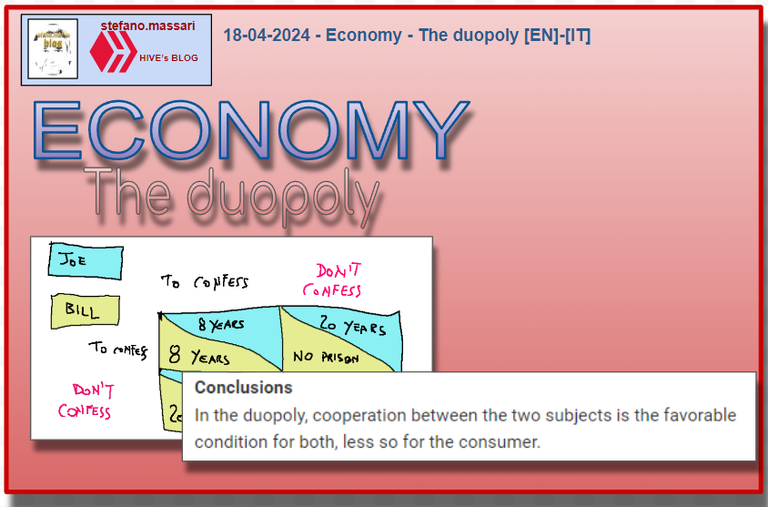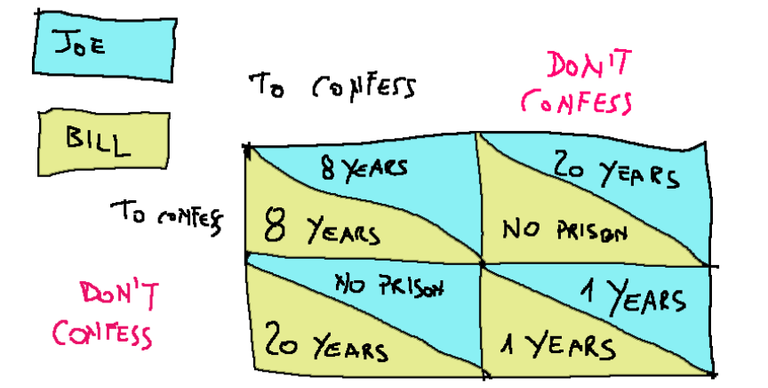18-04-2024 - Economy - The duopoly [EN]-[IT]

~~~ La versione in italiano inizia subito dopo la versione in inglese ~~~
ENGLISH
18-04-2024 - Economy - The duopoly [EN]-[IT]
The duopoly
Definition
The market called duopoly is characterized by two companies that divide the market
These two companies could cooperate or they could compete.
Nash Equilibrium
If the two companies did not operate in collaboration with each other, the NASH equilibrium conditions would come into play.
NASH equilibrium studies the fact that two subjects can operate in two distinct ways. One is cooperation and the other is individual interest.
In a duopoly system a company can start not to cooperate due to personal interests, but the interaction between the parties will generate unforeseen scenarios. If both subjects operate for personal interests, the profits will decrease and will be lower than those that could have been achieved in a duopoly market with cooperation.
The Prisoner's Dilemma
The prisoner's dilemma is a study in which the individual choices of the players, despite being dominant strategies, determine an inefficient equilibrium, that is, individual moves do not create the best condition if the best condition for both is sought.
Below is the prisoner's dilemma created by Albert Tucker in the 1950s
We note that if the subjects both confess, they will get 8 years in prison. If one of the two does not confess, he will be free, but the other will have to serve 20 years in prison.
If both confess, they will each get 1 year in prison.

In this case we note how individual choices can be extremely favorable to a single subject and very unfavorable to the other. If we try to understand what is the best condition for both, it is certainly where there is cooperation between the two, if both do not confess, they will only get 1 year in prison each.
Example
Let's take an example by imagining the oil market where AziendaONE and AziendaTWO (British Petroleum) operate.
Both operate the market and 4 conditions can occur
1-CompanyTWO has high production earning $4 billion and CompanyONE has high production earning $4 billion. In this case the production costs are high
2-CompanyTWO has high production earning $6 billion and CompanyONE has low production earning $3 billion. Advantageous condition only for one subject.
3-CompanyONE has high production earning $6 billion and CompanyTWO has low production earning $3 billion. Advantageous condition only for one subject.
4-CompanyTWO has low production earning 5 billion and CompanyONE has low production earning 5 billion. Interesting condition for both companies.
The fourth case puts both companies in a position to have lower production costs and relatively higher profits. This is the best condition for both, least convenient for the consumer.
Conclusions
In the duopoly, cooperation between the two subjects is the favorable condition for both, less so for the consumer.
Request
Have you already heard of the prisoner's dilemma? Did you know that in a duopoly the best condition for the two companies is to cooperate?

ITALIAN
18-04-2024 - Economia - Il duopolio [EN]-[IT]
Il duopolio
Definizione
Il mercato chiamato duopolio è caratterizzato da due imprese che si dividono il mercato
Queste due imprese potrebbero cooperare oppure potrebbero farsi concorrenza.
Equilibrio di Nash
Nel caso le due aziende non operassero collaborando tra loro entrerebbero in gioco le condizioni dell’equilibrio di NASH.
L’equilibrio di NASH studia il fatto che due soggetti possono operare in due maniere distinte. Una è la cooperazione e l'altra è l'interesse individuale.
In un sistema di duopolio un'impresa può iniziare a non cooperare per interessi personali, ma l’interazione tra le parti genererà degli scenari non previsti. Se entrambi i soggetti opereranno per interessi personali i profitti si abbasseranno e saranno minori di quelli che si sarebbero potuti avere in un mercato di duopolio con cooperazione.
Il dilemma del prigioniero
Il dilemma del prigioniero è uno studio in cui le scelte individuali dei giocatori, pur essendo strategie dominanti, determinano un equilibrio inefficiente, cioè le mosse individuali non creano la condizione migliore se si cerca la condizione migliore per entrambi.
Qui di seguito il dilemma del prigioniero ideato da Albert Tucker negli anni intorno al 1950
Notiamo che se i soggetti confessano entrambi, essi prenderanno 8 anni di prigione. Se uno dei due invece non confesserà egli sarà libero, ma l’altro dovrà scontare 20 anni di prigione.
Se entrambi confesseranno prenderanno 1 anno di prigione ognuno.

In questo caso si nota come le scelte individuali possano essere estremamente favorevoli ad un solo soggetto e molto sfavorevoli all’altro. Se cerchiamo di capire qual è la condizione migliore per entrambi, è sicuramente dove c’è cooperazione tra i due, se entrambi non confessano, prenderanno solo 1 anno di prigione ognuno.
Esempio
Facciamo un esempio immaginando il mercato del petrolio dove operano AziendaONE e AziendaTWO (British Petroleum)
Entrambi gestiscono il mercato e possono verificarsi 4 condizioni
1-AziendaTWO effettua una produzione elevata guadagnando 4 miliardi di $ e AziendaONE effettua una produzione elevata guadagnando 4 miliardi $. In questo caso i costi di produzione sono elevati
2-AziendaTWO effettua una produzione elevata guadagnando 6 miliardi di $ e AziendaONE effettua una produzione bassa guadagnando 3 miliardi. Condizione vantaggiosa solo per un soggetto.
3-AziendaONE effettua una produzione elevata guadagnando 6 miliardi di $ e AziendaTWO effettua una produzione bassa guadagnando 3 miliardi. Condizione vantaggiosa solo per un soggetto.
4-AziendaTWO effettua una produzione bassa guadagnando 5 miliardi e AziendaONE effettua una produzione bassa guadagnando 5 miliardi. Condizione interessante per entrambi le società.
Il quarto caso mette in condizione entrambe le aziende di avere costi minori di produzione e guadagni relativamente maggiori. Questa è la condizione migliore per entrambi, meno conveniente per il consumatore.
Conclusioni
Nel duopolio, la cooperazione tra i due soggetti è la condizione favorevole per entrambi, meno per il consumatore.
Domanda
Avevate già sentito parlare del dilemma del prigioniero? Sapevate che nel duopolio la condizione migliore per le due imprese è proprio cooperare?
THE END
I feel it is usually very hard for two companies to want to cooperate but it is always a good one if they can get it done
It will help to foster the business
Sì, È' un argomento che conosco
Ti auguro un felice fine settimana